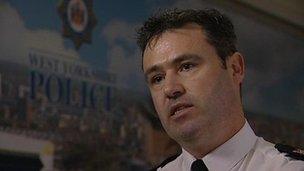Rise in 'lock snapping' burglaries in West Yorkshire
- Published

Ch Supt Paul Money said lock snapping accounted for 27% of all burglaries in December
A quarter of all burglaries in West Yorkshire are being committed by criminals using a technique called "lock snapping", police have revealed.
Since 2009, there has been a rise in the technique, which involves applying force and snapping the cylinder in two.
West Yorkshire Police said it was mainly prevalent with euro cylinder locks and urged concerned residents to seek crime prevention advice.
Ex-burglar Peter Findlay said snapping the lock was "simpler and quicker".
Mr Findlay, who now works with police to help them with crime prevention tactics, told the BBC's Inside Out programme: "If I had the best lock picks in England I wouldn't bother using them, I'd just snap the lock."
'Vulnerable' locks
Police said the technique first emerged in Bradford a couple of years ago and now accounted for more than a quarter of all burglaries across the force area.
Figures for December show that 27% of all burglaries across the county involved lock snapping on euro cylinders.
Euro cylinder locks are fitted to millions of properties, usually UPVC and other double glazed doors.
Ch Supt Paul Money, from West Yorkshire Police, said: "These locks are vulnerable to this type of attack but it can take between 50 seconds and two minutes to force the lock.
"It you're unsure about the standard and quality of your locks, contact your local crime reduction officer who will provide advice free of charge or contact some of the not for profit organisations of which there are a number in West Yorkshire."
The Association of Chief Police Officers are working with the door and lock industry to come up with a new British standard for locks.
Mr Money said: "What we want to do is ensure that the new British standard locks are a lot stronger and can resist attack.
"I wouldn't want to put a specific time frame on it but currently the testing is extensive and the new locks are now in the process of being tested."
Neil Goldup, managing director of security organisation Community Action and Support Against Crime (CASAC), said: "My one wish would be to get rid of these cylinders."